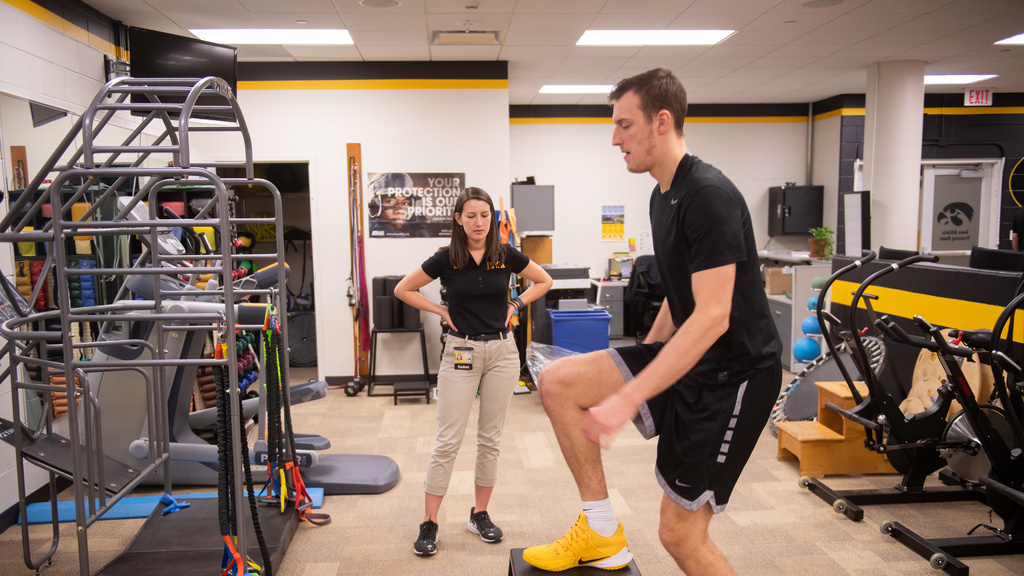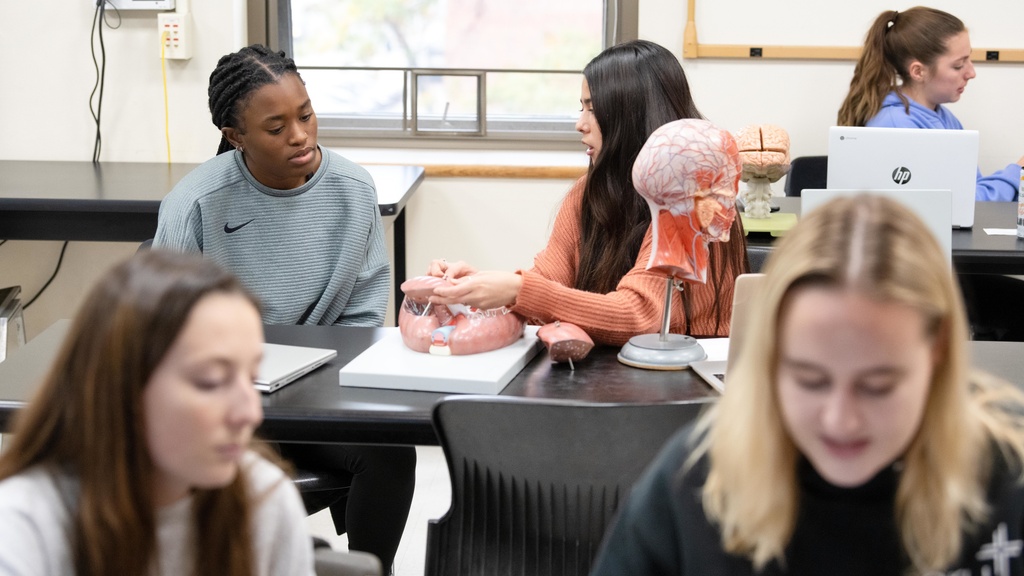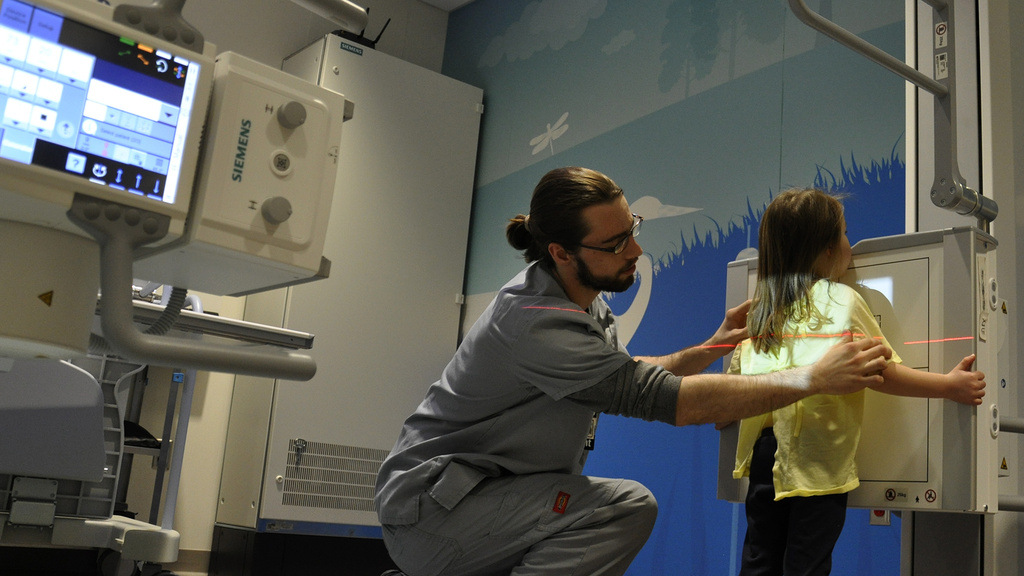At Iowa, discovery is a hands-on job. We don’t just talk about trying to cure cancer or diabetes or blindness. We get in the lab and try new treatments. So whether you’re interested in medicine, biology, nursing, public health, or chemistry, there are countless ways to participate in direct, hands-on research at one of the largest teaching hospitals in the country. At Iowa, you can make a powerful impact on the lives of patients and learn valuable, practical skills at the same time
Health Sciences

Biochemistry and Molecular Biology
Biochemistry is the study of the basic biological and chemical processes that occur in all living systems. It is an area suited to students who enjoy science and math and who may be considering a career as a research scientist. A Biochemistry and Molecular Biology degree is solid preparation for advanced-degree science programs and for careers in medicine, biology, chemistry, or dentistry.

Biology
Biology is the study of life, and advances in the understanding of living systems impact almost every aspect of modern life. From food to biofuel to medicine, biological applications are integral to modern society and further advances will be necessary to address the challenges that the future holds.

Biomedical Engineering
Biomedical Engineering blends engineering, biological science, and medicine to solve a variety of challenges facing the medical world today.
Biomedical engineers consult with physicians to design and evaluate prosthetic devices, work with new materials for implants and tissue-generated implants, perform computer analysis of medical images, and use computers to analyze genetic structures and functions.

Biomedical Sciences
The interdisciplinary Biomedical Sciences BS major is designed for undergraduate students with an aptitude for the sciences and who plan to attend medical school or conduct biomedical research in graduate school and beyond.
This program is specifically designed to cover the coursework needed for admission to medical schools and prepares students for the Medical College Admissions Test (MCAT).

Chemistry
Chemistry has a leading role in the technological challenges that touch all aspects of our lives. Global climate change, increasing demands on limited energy resources, the detection and treatment of human disease, concerns about environmental health, and the continuing need for new materials and synthetic strategies all demand an innovative response from chemists.

Dentistry Preprofessional Program
Dentistry is a field in which practitioners work to improve people's health and quality of life through preventative and corrective oral health. Dentists work as general dentists in clinical settings or with advanced degrees in orthodontia, pediatric dentistry, or hospital and operative dentistry. Additional career opportunities include researching dental diseases and treatment techniques.

Exercise Science
Exercise Science focuses on the body’s response to the various effects of exercise. The program offers many lab-based courses that allow students to apply their knowledge.
Health Promotion
Health Promotion is the process of empowering others to improve their physical, mental, and social well-being.
Health promotion specialists are communicators and problem solvers who identify solutions to advance the health and wellness of those in need.

Health Studies
Health Studies provides students with a big picture understanding of the major determinants of health including health behaviors, clinical care, social factors, and environmental factors.

Human Physiology
Human physiology is the science of how the human body functions in health and disease.
A degree in human physiology provides excellent preparation for careers or graduate study in biomedical research and the health professions or related disciplines.
Medical Laboratory Science
Medical laboratory scientists perform a full range of laboratory tests used by physicians to diagnose and treat disease. They work quickly and carefully to confirm the accuracy of test results and report laboratory findings to pathologists and patients' physicians.
Medicine Preprofessional Program
The Doctor of Medicine (MD) degree is a professional degree program that requires first completing an undergraduate degree. The University of Iowa offers a pre-health sciences designation (also known as "pre-med") for undergraduate students that provides specialized advising and course work in preparation for medical school.
Microbiology
Microbiology is the branch of biology that studies the smallest living things: bacteria, fungi, algae, protozoa, and viruses. It also studies immunology—how higher organisms respond to foreign substances.
This is an excellent major for undergraduate students who want a good general education with an emphasis on an important and interesting branch of biology. It also is an excellent major for students who plan to pursue advanced degrees in medicine, dentistry, or another health profession.
Examples of what microbiologists do include:
Neuroscience
Understanding how the brain performs its functions and gives rise to cognition, learning, and behavior is one of the last frontiers of science. We are in an era of intense interest in neuroscience, the field of scientific inquiry focused on explaining how the brain works.

Nuclear Medicine Technology
Nuclear medicine technologists are professionals in a medical specialty that uses radioactive tracers for diagnostic, therapeutic, and research purposes. They work hand in hand with nuclear medicine physicians, health physicists, radio pharmacists, and radiochemists as members of highly trained specialty teams.
Nursing
Nursing is not just a major, but a career with limitless opportunities to work in a variety of settings and impact numerous populations.
Nursing is holistic and focused on providing and coordinating patient care. Our nursing students tend to be industrious, focused, altruistic, and dedicated people who enjoy contact with patients.

Pharmacy Preprofessional Program
Career options in pharmacy range from filling prescriptions at neighborhood stores to conducting research, engaging in clinical practice, and teaching. Pharmacists also consult with and counsel patients and other health care professionals. Many are involved in medication therapy management, providing drug therapy to improve patients’ lives.
Along with their science training and expertise in drug selection and preparation, pharmacists must have the business and communication skills necessary for multifaceted careers.

Physical Therapy Preprofessional Program
Physical therapists are committed to meeting the health needs of society through prevention, rehabilitation, public education, and research. They promote optimal human health and function by applying scientific principles to prevent, identify, assess, and correct acute or prolonged movement dysfunction problems.
Specialization areas in physical therapy include cardiopulmonary systems, electrophysiology, geriatrics, neurology, orthopedics, pediatrics, sports physical therapy, and women’s health.
Physician Assistant Preprofessional Program
If you’re interested in medicine and in helping people but are concerned about the requirements and cost of a lengthy medical school program and residency, physician assistant studies may be a good choice for you.
Physician assistants (PAs) are health professionals licensed to practice medicine with supervision by a physician. PAs work together with other medical professionals as members of health care teams.

Public Health
Public health professionals use specialized skills and knowledge to better understand the underlying causes of diseases and injuries and develop strategies to prevent them. They promote healthy lifestyles, develop vaccines, ensure the safety of the food supply and new drugs, implement programs that protect workers' health, and shape policies that ensure quality health care.

Radiation Sciences
Radiation sciences professionals work with a team of health professionals to gather accurate patient information for diagnosis and treatment of disease and injury.
Technologists operate x-ray, CT (computed tomography), MRI (magnetic resonance imaging), radiation therapy, ultrasound, and similar equipment essential in a hospital or health care setting.

Speech and Hearing Science
Speech pathologists and audiologists evaluate the communication skills of people with speech, language, and hearing disorders, and develop and implement appropriate treatment plans.
Clinical practitioners may work in school settings, hospitals, community clinics, rehabilitation facilities, or in private practice.
Therapeutic Recreation
Therapeutic practice involves a continuum of services that use recreational activities to improve functional abilities; leisure education to help individuals acquire skills, knowledge, and attitudes that facilitate an independent lifestyle; and other programs to enhance health, growth, development, and independence through rewarding leisure activities.